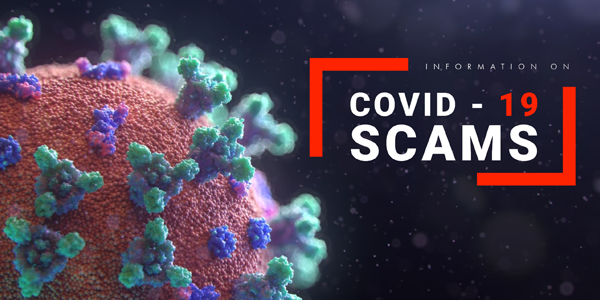COVID-19 Scams
During the pandemic, there have been new opportunities for criminals to commit fraud by attempting to take advantage of people through COVID-19 scams. Knowledge about these scams can help you avoid being victimized. Red Crown has made a list of tips to keep you alert about COVID-19 fraud.
Unemployment Benefits
One major scheme that criminals are doing is taking someone’s personal information and filing unemployment claims. They are targeting employed people. People learn about this scam when they receive a notice from the unemployment benefits office or their employer.
If this happens to you, the quicker you act on the issue, the better! Click HERE to learn more about how to protect your finances/credit from this scam.
Relief Check Scams
The IRS has said they will be distributing the third round of relief checks the same way they did for the first round. The IRS saw scams with the last round and want you to be aware of some red flags. Below is what the IRS will not do:
- Claim you received an overpayment and ask you to return the money.
- Send you a password to use online to access or verify your account.
- Contact you by email or social media to gather personal information.
One important thing to remember is that the IRS will first contact you by mail. For more information, go to the IRS website.
Vaccine and Treatment Scams
Criminals are now selling fake COVID-19 test kits and unapproved treatments through phone calls, social media, and at your door. Two scams you should be aware of are COVID-19 Testing Schemes and COVID-19 Treatment Schemes.
- COVID-19 Testing Schemes: The scammer will say you are required to take a COVID-19 test. They will try to get your health insurance and other personal information. Once they have your information, they will bill the health insurance plan for tests/procedures that you did not get. The scammer will then receive money off those fake bills.
- COVID-19 Treatment Schemes: These scammers are selling fake cures, treatments, and vaccines. They will ask for your health insurance information and other personal information. Approved treatment will not be communicated to the public this way. When approved treatments become available, you will not hear about them through a phone call, email, or online advertisement.
Never give your personal/health information to someone you do not know or trust. You should only share your information with a trusted medical professional.
For more information, go to https://www.fbi.gov/news/pressrel/press-releases/fbi-warns-of-emerging-health-care-fraud-schemes-related-to-covid-19-pandemic.
Other COVID-19 Related Scams
Fraudsters have always used emails, phone calls, or in-person methods to scam people. Below is a list of cons being used to get your medical/personal information:
- Scammers are imitating the IRS through phone calls, emails, social media, and texts.
- Robocalls making fraud offers to sell respiratory masks and other medical equipment/devices.
- Fake emails to your personal/business account that appear to come from a trusted source.
- Creating a non-existent charitable organization that is trying to get your money/or personal information. Make sure you do your research before clicking on links to donate.
Conclusion
Criminals will continue to find new methods to exploit people through COVID-19 scams. Remember, do not give out your personal or bank information – stay alert. For more information, go to fbi.gov/coronavirus and the FTC at FTC.gov/coronavirus.
*Red Crown Credit Union is not a financial advisor. The FBI, Consumer FTC, and IRS websites were used for writing this blog. This blog gives general ideas on ways to stay alert for COVID-19 fraud. Individual results may vary.






